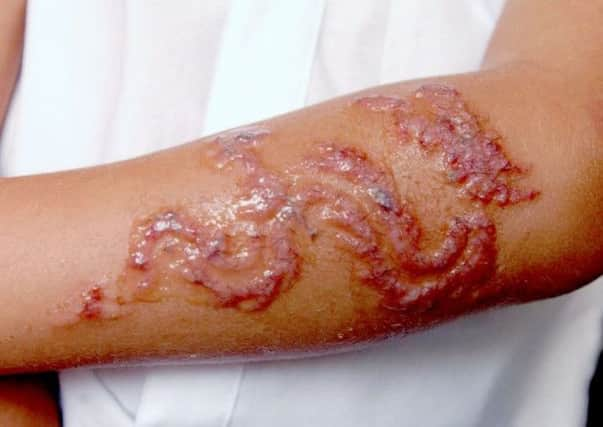Video: Warning over ‘black henna’ temporary tattoos


Parents hoping to treat their children to a temporary tattoo on holiday or at the funfair, along with party-goers at festivals may not realise the dangers of BHTT.
The majority of BHTT are not based on henna at all, but a substance called para-phenylenediamine which is found in hair dyes. PPD is allowed for use in hair dye, but its use for skin contact products such as temporary tattoos is illegal in the European Union.
Advertisement
Hide AdAdvertisement
Hide AdWhen PPD is used on the skin in this way it can cause blistering, painful skin burns and may even lead to scarring. It can also leave the person with a lifelong sensitivity to PPD, which increases the risk of a severe allergic reaction when using hair dye in future.
The British Skin Foundation survey found:
· 4 out of 10 dermatologists asked had seen patients with skin reactions to BHTTs.
· 1 in 20 dermatologists approached said over 80% of the BHTT reactions they had seen were in children aged under 16.
· Dermatologists asked confirmed around half of the patients got a BHTT outside the EU, where the legal status of PPD is not always clear; however the other half got a BHTT within the EU, with 27% of these in the UK.
Advertisement
Hide AdAdvertisement
Hide Ad· About two-thirds of dermatologists approached have seen an increase in patients with reactions to hair dyes, many of whom have previously had a BHTT.
Dr Anjali Mahto, Consultant Dermatologist & British Skin Foundation Spokesperson, said: “Black henna is well known to cause skin reactions and should be treated with caution, particularly in children.”
The decision to issue this warning is backed by the Cosmetic, Toiletry & Perfumery Association.
Dr Christopher Flower, Director-General CTPA, said: “The message is clear: having a ‘black henna’ temporary tattoo presents a significant risk of a very nasty adverse reaction to the tattoo itself.
Advertisement
Hide AdAdvertisement
Hide Ad“It also increases the risk of either not being able to use most hair dyes in future or having a bad reaction to them if the warnings are ignored.
“This summer, parents will want to keep their children safe, by steering clear of so-called ‘black henna’ temporary tattoo.”
Find out more ’Skinformation’ on the British Skin Foundation website.